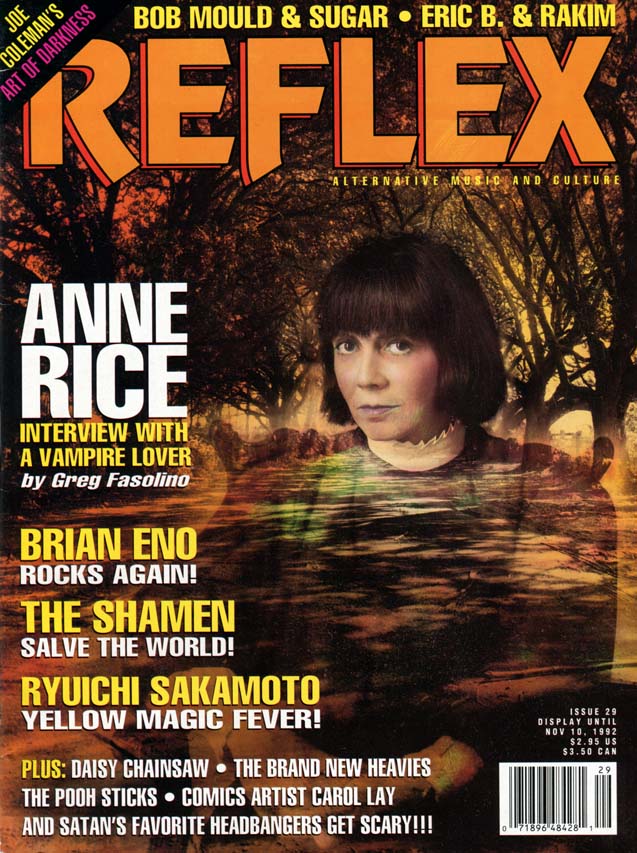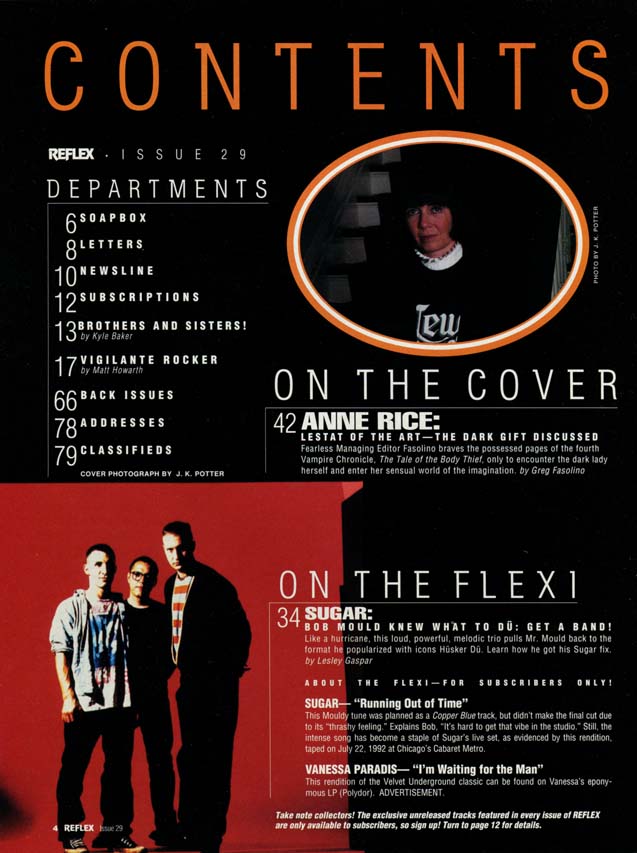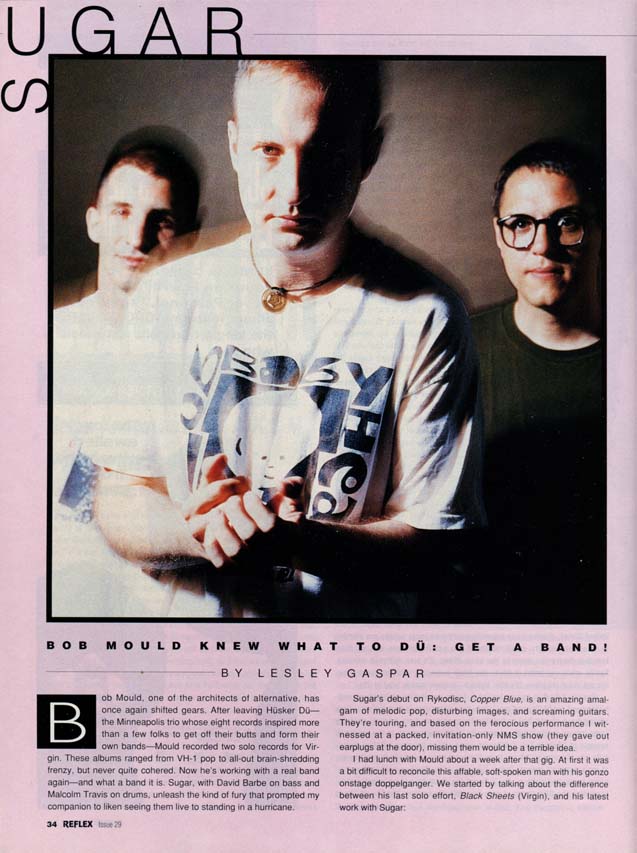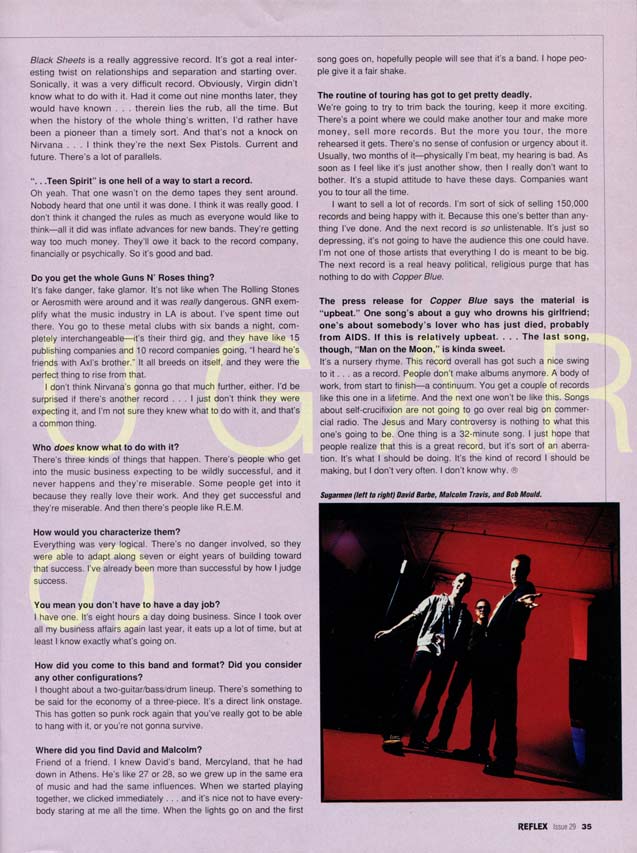
Magazine cover

Magazine table of contents page

Sugar article page 1

Sugar article page 2
|
US glossy magazine Reflex rode the crest of the 90s "alternative" wave.
This issue hit the street in Oct 1992, as Sugar was touring the
Copper Blue album, and included the article reproduced below. Written
by Lesley Gaspar, it consists mainly of an interview with Bob Mould. Copies
of the magazine sent to subscribers (but not those sold on the newsstand)
included a
flexidisc recording of Sugar's then-unreleased "Running Out Of Time."
Scans from the magazine are followed by a transcription of the article text. Cover photo: J. K. Potter. Sugar photos are uncredited, presumably Rykodisc publicity shots. |

Magazine cover |

Magazine table of contents page |

Sugar article page 1 |

Sugar article page 2 |
|
BOB MOULD KNEW WHAT TO DÜ: GET A BAND!
——————— BY LESLEY GASPAR ——————— | |
|
Bob Mould, one of the architects of alternative, has once again shifted gears.
After leaving Hüsker Dü— the Minneapolis trio whose eight
records inspired more than a few folks to get off their butts and form their
own bands—Mould recorded two solo records for Virgin. These albums
ranged from VH-1 pop to to all-out brain-shredding frenzy, but never quite
cohered. Now he's working with a real band again—and what a band it is.
Sugar, with David Barbe on bass and Malcolm Travis on drums, unleash the kind
of fury that prompted my companion to liken seeing them live to standing in a
hurricane.
Sugar's debut on Rykodisc, Copper Blue, is an amazing amalgam of melodic pop, disturbing images, and screaming guitars. They're touring, and based on the ferocious performance I witnessed at a packed, invitation-only NMS show (they gave out earplugs at the door), missing them would be a terrible idea. I had lunch with Mould about a week after that gig. At first it was a bit difficult to reconcile this affable, soft-spoken man with his gonzo onstage doppelganger. We started by talking about the difference between his last solo effort, Black Sheets (Virgin), and his latest work with Sugar: [Bob] Black Sheets is a really aggressive record. It's got a real interesting twist on relationships and separation and starting over. Sonically, it was a very difficult record. Obviously, Virgin didn't know what to do with it. Had it come out nine months later, they would have known... therein lies the rub, all the time. But when the history of the whole thing's written, I'd rather have been a pioneer than a timely sort. And that's not a knock on Nirvana... I think they're the next Sex Pistols. Current and future, there's a lot of parallels. "...Teen Spirit" is one hell of a way to start a record. Oh yeah. That one wasn't on the demo tapes they sent around. Nobody heard that one until it was done. I think it was really good. I don't think it changed the rules as much as everyone would like to think—all it did was inflate advances for new bands. They're getting way too much money. They'll owe it back to the record company, financially or psychically. So it's good and bad. Do you get the whole Guns N' Roses thing? It's fake danger, fake glamor. It's not like when The Rolling Stones or Aerosmith were around and it was really dangerous. GNR exemplify what the music industry in LA is about. I've spent time out there. You go to these metal clubs with six bands a night, completely interchangeable—it's their third gig, and they have like 15 publishing companies and 10 record companies going. "I heard he's friends with Axl's brother." It all breeds on itself, and they were the perfect thing to rise from that. I don't think Nirvana's gonna go much further, either. I'd be surprised if there's another record... I just don't think they were expecting it, and I'm not sure they knew what to do with it, and that's a common thing. Who does know what to do with it? There's three kinds of things that happen. There's people who get into the music business expecting to be wildly successful, and it never happens and they're miserable. Some people get into it because they really love their work. And they get successful and they're miserable. And then there's people like R.E.M. How would you characterize them? Everything was very logical. There's no danger involved, so they were able to adapt along even or eight years of building toward that success. I've already been more than successful by how I judge success. You mean you don't have a day job? I have one. It's eight hours a day doing business. Since I took over all my business affairs again last year, it eats up a lot of time, but at least I know exactly what's going on. How did you come to this band and format? Did you consider any other configurations? I thought about a two-guitar/bass/drum lineup. There's something to be said for the economy of a three-piece. It's a direct link onstage. This has gotten so punk rock again that you've really got to be able to hang with it, or you're not gonna survive. Where did you find David and Malcolm? Friend of a friend. I knew David's band, Mercyland, that he had down in Athens. He's like 27 or 28, so we grew up in the same era of music and had the same influences. When we started playing together, we clicked immediately... and it's nice not to have everybody staring at me all the time. When the lights go on and the first song goes on, hopefully people will see that it's a band. I hope people give it a fair shake. The routine of touring has got to get pretty deadly. We're going to try to trim back the touring, keep it more exciting. There's a point where we could make another tour and make more money, sell more records. But the more you tour, the more rehearsed it gets. There's no sense of confusion or urgency about it. Usually, two months of it—physically I'm beat, my hearing is bad. As soon as I feel like it's just another show, then I really don't want to bother. It's a stupid attitude to have these days. Companies want you to tour all the time. I want to sell a lot of records. I'm sort of sick of selling 150,000 records and being happy with it. Because this one's better than anything I've done. And the next record is so unlistenable. It's just so depressing, it's not going to have the audience this one would have. I'm not one of those' artists that everythng I do is meant to be big. The next record is a real heavy political, religious purge that has nothing to do with Copper Blue. The press release for Copper Blue says the material is "upbeat." One song's about a guy who drowns his girlfriend; one's about somebody's lover who has just died, probably from AIDS. If this is relatively upbeat.... The last song, though, "Man on the Moon," is kinda sweet. It's a nursery rhyme. This record overall has got such a nice swing to it... as a record. People don't make albums anymore. A body of work, from start to finish—a continuum. You get a couple of records like this one in a lifetime. And the next one won't be like this. Songs about self-crucifixion are not going to go over real big on commercial radio. The Jesus and Mary controversy is nothing to what this one's going to be. One thing is a 32-minute song. I just hope that people realize that this is a great record, but it's sort of an aberration. It's what I should be doing. It's the kind of record I should be making, but don't very often. I don't know why. ® | |
Back to Hüsker Dü magazine articles page
Back to Hüsker Dü database main page